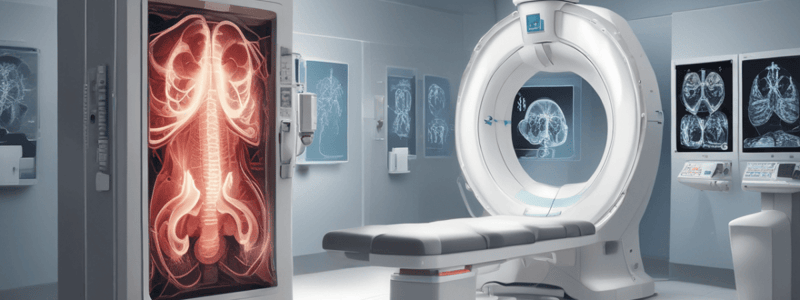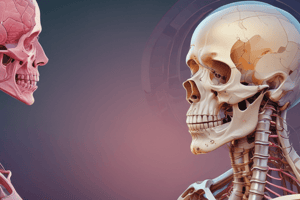Podcast
Questions and Answers
What is the topic of Lecture 2 in Diagnostic Radiology?
What is the topic of Lecture 2 in Diagnostic Radiology?
- Imaging modalities and medical applications (correct)
- Diagnostic radiology
- Medical applications
- Imaging modalities
Which imaging modality uses ionizing radiation?
Which imaging modality uses ionizing radiation?
- MRI
- Ultrasound
- Plain x-rays
- All of the above except MRI and Ultrasound (correct)
What is the name of the image formed using broad beam ionizing radiation?
What is the name of the image formed using broad beam ionizing radiation?
- Plain film
- Conventional Radiography
- Standard film
- All of the above (correct)
What is the image formed in Plain films related to?
What is the image formed in Plain films related to?
What may be used in Plain films?
What may be used in Plain films?
What is a common indication for requesting a chest x-ray?
What is a common indication for requesting a chest x-ray?
What is another indication for requesting a plain x-ray?
What is another indication for requesting a plain x-ray?
What is the purpose of a plain x-ray before introducing a contrast medium?
What is the purpose of a plain x-ray before introducing a contrast medium?
What is another medical application of plain x-rays?
What is another medical application of plain x-rays?
What is the purpose of a plain x-ray in musculoskeletal diseases?
What is the purpose of a plain x-ray in musculoskeletal diseases?
What is the main limitation of conventional radiographs that leads to the need for a better modality?
What is the main limitation of conventional radiographs that leads to the need for a better modality?
How are images formed in CT scans?
How are images formed in CT scans?
What is the main advantage of CT scans over conventional radiography?
What is the main advantage of CT scans over conventional radiography?
What is the purpose of a CT scanner?
What is the purpose of a CT scanner?
What is the advantage of CT scans in differentiating anatomic structures and abnormalities?
What is the advantage of CT scans in differentiating anatomic structures and abnormalities?
What is the image display method in CT scans?
What is the image display method in CT scans?
What is the advantage of CT scans in pre-surgical planning?
What is the advantage of CT scans in pre-surgical planning?
What is the term for the sheets of glass that cut through the body in various ways in CT scans?
What is the term for the sheets of glass that cut through the body in various ways in CT scans?
What is the orientation of the axial imaging plane in CT scans?
What is the orientation of the axial imaging plane in CT scans?
What is the term for the latest technology in CT scanners?
What is the term for the latest technology in CT scanners?
Flashcards are hidden until you start studying
Study Notes
Imaging Modalities in Diagnostic Radiology
- Imaging modalities used in diagnostic radiology include plain x-rays, CT scan, MRI, nuclear imaging/PET, ultrasound, mammography, angiography, and fluoroscopy.
- Some of these modalities use ionizing radiation, which includes plain x-rays, CT scan, and fluoroscopy.
Plain X-Rays or Conventional Radiography
- Also known as "plain films" or "standard films"
- Image formed using broad beam ionizing radiation
- The image formed is related to the subject's density
- May involve the use of contrast agents, such as iodinated, barium, and air
- Indications for requesting x-rays include:
- Chest x-ray for primary lung disease and pulmonary effects of diseases in other organ systems
- Abdomen and pelvis cavity for obstruction of the bowel, perforation, renal pathology, and acute abdomen
- Musculoskeletal diseases, such as fractures and dislocations, serious injury or foreign bodies, and pathology
Limitations of Conventional Radiographs
- Superimposition
- Inability to distinguish soft tissue (poor contrast)
- Radiography is qualitative rather than quantitative
Computed Tomography (CT)
- Image formed using a rotating thin beam(s) of ionizing radiation
- Image "slices" reconstructed by computation
- The image formed is related to the subject's density
- Image display on computer or multiple films
- New technology is multislice helical scanner
Advantages of CT over Conventional Radiography
- The elimination of superimposed structures
- The ability to differentiate small differences in density of anatomic structures and abnormalities
- The superior quality of the images
- CT is used to determine the extent of trauma, location and type of tumors, status of blood vessels, and pre-surgical planning
Imaging Planes
- Horizontal/transverse
- Vertical/longitudinal
- Coronal
- Sagittal
- Oblique
- Axial
Studying That Suits You
Use AI to generate personalized quizzes and flashcards to suit your learning preferences.




